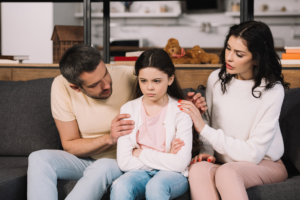When Parenting is Scary: Parenting Kids with Depression, Anxiety, and More

In a coaching group for parents of young adults (ages 18 to 30something), a beleaguered mom asked the question on many parents' minds. When we're parenting kids with depression and related issues, she asked, "What do I do when I feel like he's not safe? There's some scariness to it."
Indeed, if you're paying attention, parenting is scary – in the best of circumstances. When you add a modern world that brings with it challenges of education, substance use, sexuality and gender questions, plus an additional layer of diagnoses like depression, anxiety, and ADHD – parenting can be downright terrifying.
Parenting is Scary
Below is an excerpt from the conversation that followed, where I address a few different topics in response to this mom’s not-so-simple question. I hope it offers a combination of reality and hope for any who are parenting kids through turbulent times and feelings.
"It can be overwhelming and scary as a parent. Many, many of us – at least half of us in this room – are dealing with issues like depression and anxiety, and that can be scary as hell.
As a parent, I've been raising a child with depression since they were a really little kid, and so I know personally how scary it can be. Because there are no guarantees. I can't sit here and tell you everything's going to be okay. But I can tell you that chances are better for you than for most – because you're here, having this conversation.
In fact, you’ve been having these difficult conversations for a while. You are consciously changing how you communicate. You’re focused on staying connected and trying to address these difficult issues. And so you have significantly increased your odds for success.
This is hard stuff. This is real stuff. This is the real stuff of life. And your odds are way better because you’re facing it head on.
I won't sugar-coat it for you and make it OK. But I will tell you that incremental change is where transformation takes place.
When safety is the bottom line, or when you're concerned about it, then that's where you Take Aim. For some that means designing overt conversations with teens or young adults about safety. It means asking if they are safe, or having really hard conversations about suicidal ideation and how you would know if they are at risk. You can actually have conversations about these topics. You can make the commitment to talk about it.
I understand that those are hard conversations to have. And we have to have them. What I'm giving you in this course are tools to open up these difficult conversations, instead of shutting them down."
Another mom in the group stepped into the conversation and said, "I'm willing to take the blame for most things in the world, but I'm not going to take the blame for everything that's wrong with my child. When children that have depression, anxiety, impulsivity, and they are like that from infancy, it’s genetic. I get that these strategies can help. But they're not the solution to solving them."
And then, I stepped onto my soapbox for a minute. As a mom to kids with depression, as a wife to a husband with depression, this is very close to my heart.
Article continues below...
Want to Go from Chaos to Calm?
Download a free tipsheet, "10 Tips for Calm & Confident Parenting." Use the coach-approach to change the tone in your home or classroom -- starting now!
Solutions are in the Conversations
So I responded: "Let me be clear: there is no solution. We are talking about chronic management issues. We have kids with neurological, mental-health and related conditions that require ongoing, conscious management. Our job is to understand these issues well enough, to enroll our kids in the process of understanding themselves well enough, to step into the ownership of managing themselves. Because there is no pill you're going to give them that's going to make all this go away.
And so, it's not about blame at all. Here's where you are. You can't do anything to change what's happened up until now. Whatever has happened, whatever genetics, whatever you've done, whatever you haven't done – up until this moment in time – you can't change anything that's happened up until now.
So here’s the good news: You have the power from here forward to begin to think differently and to shift the way that you communicate, so you can empower your kids to take ownership of their lives.
There's no right or wrong here. But there are some ways to approach these conversations that will dramatically improve the possibility of making things better. Because it's not going away. This is who they are and how they're wired.
Most of us spent the first 10 years after our kids were born or diagnosed trying to figure out how to fix their wiring. It took a while before we finally came to the realization that we can't fix this. Maybe it’s just dawning on you now. That’s OK.
So I’m here to tell you – we must learn to manage it. It's hard to accept that, I know. But I can promise you this: once you do, it actually gets easier, and it gets lighter. I've watched it. I’ve lived it. You can live with a really deep depression and still laugh. There can still be joy and connection.
Joy Comes from Connection
In fact, that's the thing about depression. Depression is not being sad when things are bad. It's about feeling depressed when everything's reasonably good. Managing depression is about having the resources, the connection, and the relationships to be able to get yourself through it when life feels crushing. To get yourself to a place where you're not inundated by it as much anymore.
Depression is something you live with and manage. It’s the same with anxiety. And it's the same with ADHD.
We live with it. And sometimes, in some phases of life, it's easier than others. But it's the relationships and the connections that keep us going. Oftentimes, that’s what keeps us alive.
My family members are alive because I was willing to have really difficult conversations with them. And because we were willing to make deals with each other, to have open, honest conversations. Sometimes, when someone struggling with depression is having a hard time staying alive for themselves, they can find strength in staying alive for those they love. Because they have connection, and they don’t want to "do that" to their family.
I don't want to, for a minute, take away how incredibly scary and real it is. Because it is. Parenting kids with depression and related challenges is scary. But I can tell you this for certain: when you lean into relationship, it's often the one thing that can pull people out of deep, dark holes."
Following my little monologue, there was silence in the Zoom room. A lot of us sat with the awareness that we are parenting kids with depression and related challenges, and it stinks. A lot of us were accepting that for us, parenting is scary.
And then another parent spoke up. "I'm really glad you said that. Thank you for validating how hard it is for us. I've thrown everything at this to kind of fix it. And now, like you said, I’m trying to help my kid learn to thrive with it. That's a shift."
Indeed, that’s the shift that will lighten the load – for your kids, and for you – when parenting kids with depression or anxiety. Or, for that matter, any time when parenting is just plain scary. Lasting change comes in incremental steps from authentic connection and transparent communication.
IMPORTANT NOTE: If your child, youth, or young adult is depressed, it is paramount to watch out for the risk factors for suicide. While this may sound scary, it can be empowering to know what to do and to be able to talk honestly with your child. According to the American Academy of Pediatrics, risk factors include increased thoughts about death, giving away belongings, talking about suicide in person or on the internet and substance use. If you notice these behaviors and are concerned, talk to your child. Talking to your child will encourage them to not complete suicide. It will give them a message of caring and hope. In addition, contact their health provider and encourage your youth or young adult to simply call or text 988, or contact the 988 Suicide & Crisis Lifeline.


